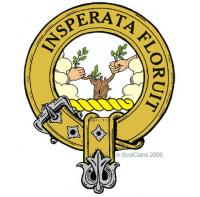
Clan Watson
The name Watson derives from Walter along with many others such as Wat, Watt MacWattie, Macouat and MacWatson. The name is fairly common throughout Scotland (listed 20th most common in 2003) and England, but is more strongly associated with certain areas such as Aberdeen and Kinkardineshire.
The Watsons are linked to the Forbes clan in Angus and to the Buchanans in Stirlingshire and western Perthshire.
- In the fourteenth century there are Watson landowners in Edinburgh.
- 1402 The records show a Robert Watsoun living in Aberdeen.
- 1450 Nicholas Watson of Dalkieth held land near Arbroath.
- 1493 Sir Donald Watsone was a church presbyter in the diocese of Moray
- 1494 Walter Watson was a burgess and landowner in Dumbarton and a number of his descendants became bailies and provosts.
In the 16th century the name became more common, being found particularly in the Lowlands and the North-East of Scotland. In the Aberdeen area, the name Wattie was popular and in a Banffshire fishing village, 225 of the 300 people living there being named Watt. The name McWatters is found almost exclusively in Caithness where it is believed they were followers of the Sinclairs.
In 1741, George Watson founded 'George Watson's College', now known simply as 'Watsons'. Born in 1654, his parents died when he was very young, but he was sent to study book-keeping in Rotterdam by his aunt. He went on to become chief accountant to the Bank of Scotland in 1695 and was a great educational philanthropist in Edinburgh.
James Watt is probably the most famous of this name. He was an engineer and inventor, his best known invention being the modern steam engine. He was ranked first, tying with Edison, out of 229 significant figures in the history of technology in Charles Murray's book Human Accomplishments
Robert Watson-Watt was a descendant of James Watt and is credited with developing radar from theory to a workable system which was described as being fundamental to victory in the Battle of Britain.
According to the Clan Watson Society of Canada, the Lord Lyon has confirmed that the clan does have a chief, but the title has not been claimed since it was held by James Watson of Saughton in 1818.







